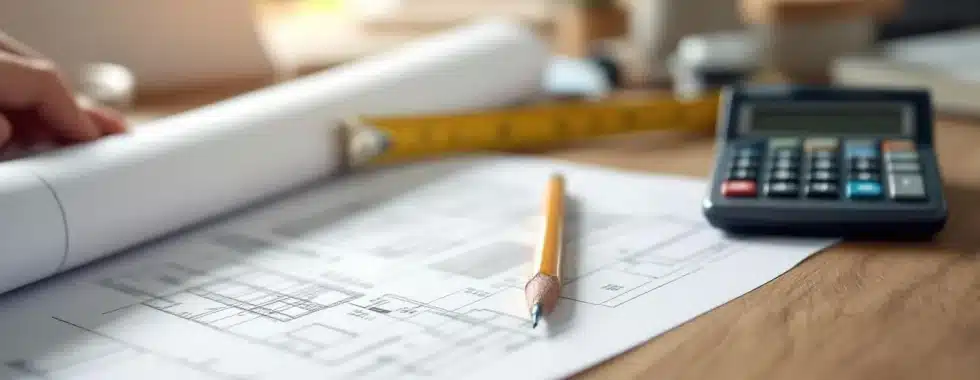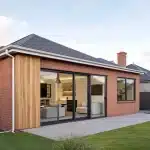How to Calculate Extension Costs in Melbourne
Planning a home extension in Melbourne requires careful financial preparation. The cost of extension Melbourne projects varies significantly based on size, complexity, and location.
We at Cameron Construction understand that accurate budgeting makes the difference between a successful project and costly surprises. This guide breaks down the real costs you’ll face when extending your Melbourne home.
Key Cost Factors for Melbourne Extensions
Material Prices and Labour Shortages
Melbourne extension costs depend on three major factors that directly impact your budget. Construction material prices have increased 15-20% since 2022 according to the Australian Bureau of Statistics, with timber framing costs up 25% and steel reinforcement prices up 18%. Labour rates now average $85-95 per hour for skilled trades, with experienced carpenters earning $100+ per hour due to chronic skills shortages across Victoria.
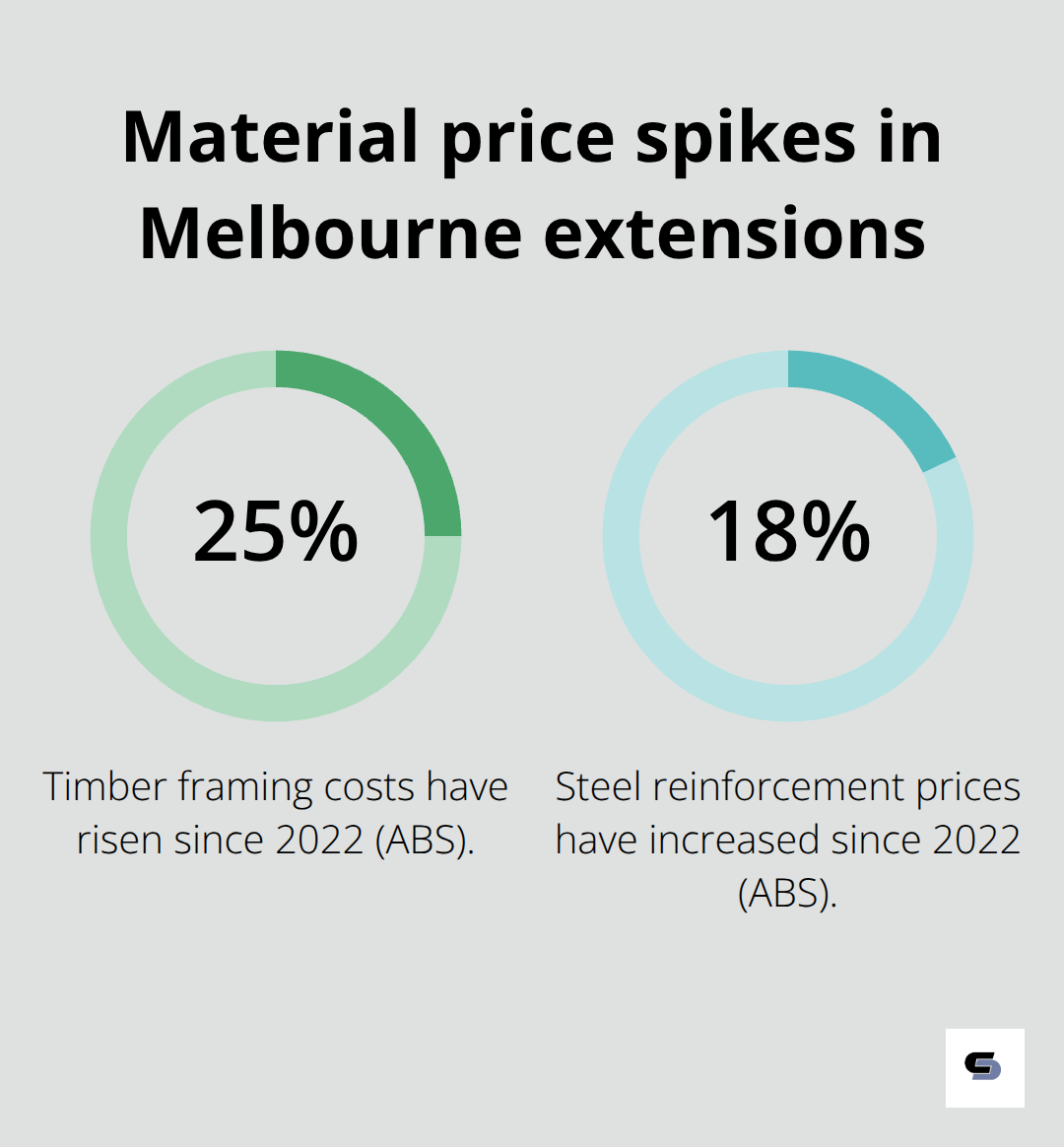
Soil Testing and Foundation Requirements
Site conditions dramatically affect your extension budget, particularly Melbourne’s variable clay soils. Reactive clay soils require deeper footings and additional reinforcement, which adds $8,000-15,000 to foundation costs. A geotechnical soil report provides foundation data including information based on soil tests, which recommends the depth of stumps or type of slab or strip footing required. Poor drainage or contaminated soil can double foundation expenses, which makes early soil assessment essential for accurate budget planning.
Council Permits and Planning Fees
Melbourne council fees vary significantly by location and project scope. Planning permit applications start at $1,453 for single dwellings and escalate to $63,589 for developments over $5 million according to Victorian planning regulations. Building permits add another $2,000-8,000 depending on extension size, plus the building permit levy calculated on total construction value. Double storey extensions often require additional engineering reports and neighbour consultation, which increases permit timeframes to 8-12 weeks and adds $3,000-5,000 in professional fees.
Heritage and Character Overlays
Heritage overlays or neighbourhood character studies can triple permit costs and extend approval periods to six months. These overlays require specialist heritage reports ($2,500-4,000) and detailed design documentation that matches existing architectural features. Character overlays demand specific material choices and design elements that can increase construction costs by 20-30% compared to standard extensions.
These cost factors form the foundation of your extension budget, but the type of extension you choose will determine your final investment.
Breakdown of Extension Costs by Type
Ground floor extensions offer the most cost-effective path to additional space, with costs that average $3,200-4,800 per square metre for standard construction. Single-storey additions avoid structural complications and complex engineering, which keeps costs predictable. A typical 40 square metre ground floor extension ranges from $128,000-192,000 (materials, labour, and basic finishes included). Premium finishes and complex layouts push costs to $5,500 per square metre, while basic extensions with standard fixtures start around $2,800 per square metre.
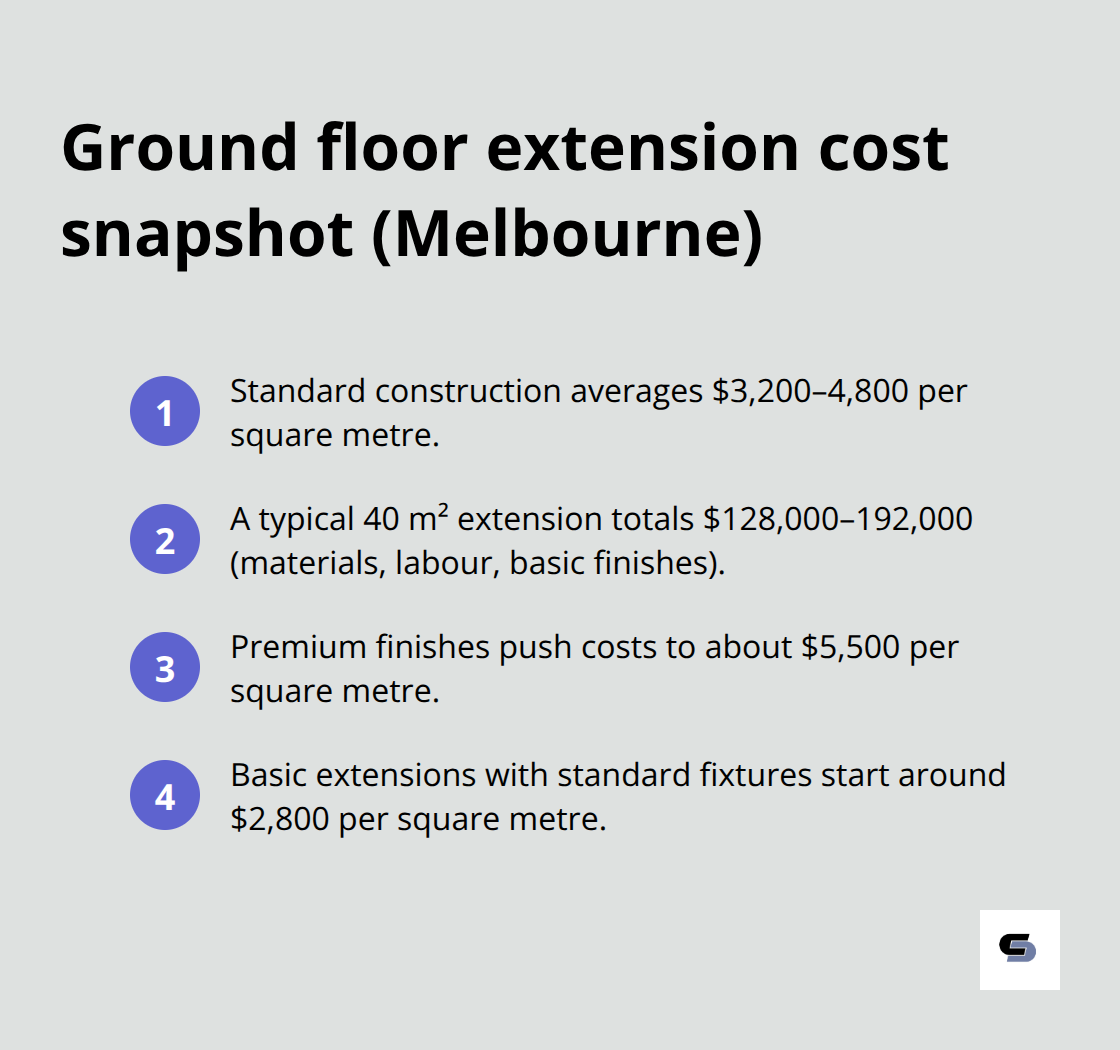
Double Storey Extensions Demand Higher Investment
Double storey extensions cost significantly more at $4,500-6,200 per square metre due to structural complexity and engineering requirements. The lower level requires reinforced foundations to support upper floor loads, while structural steel beams and additional bracing increase material costs by 30-40%. A 60 square metre double storey extension typically costs $270,000-372,000, but provides twice the floor area compared to single storey alternatives. Engineering fees alone add $8,000-12,000 to double storey projects, plus extended construction timeframes of 16-20 weeks versus 10-14 weeks for ground floor additions.
Second Storey Conversions Present Maximum Complexity
Second storey conversions present the highest cost per square metre at $5,800-7,500 due to extensive structural modifications. Existing foundations rarely support additional loads without reinforcement, which requires underpinning or pier installation that costs $15,000-25,000. Roof removal and reconstruction adds another $20,000-35,000, while structural steel framework costs $180-220 per square metre. Most Melbourne homes built before 1990 need complete electrical and plumbing upgrades to current standards (adding $25,000-40,000 to conversion costs). These projects demand 20-26 weeks completion time and specialist structural engineering throughout the process.
Heritage Properties Add Premium Costs
Heritage overlays significantly impact extension costs across all types. Heritage-listed properties require specialist reports, heritage architect consultations, and materials that match original construction methods. These requirements add 25-35% to standard extension costs and extend approval timeframes to 6-8 months. Character overlay areas impose similar restrictions but with less stringent requirements (typically adding 15-20% to base costs).
While extension type determines your base investment, numerous hidden costs can dramatically impact your final budget and timeline.
Hidden Costs and Budget Planning
Extension projects inevitably generate unexpected expenses that catch homeowners unprepared. Structural surprises represent the biggest budget threat, with Melbourne extension projects often requiring additional structural work as construction activity continues to grow across the industry. Existing foundations often need reinforcement costing $12,000-18,000, while asbestos removal adds $8,000-15,000 for homes built before 1987.
Compliance and Infrastructure Upgrades
Electrical upgrades to meet current Australian Standards cost $6,000-12,000, and plumbing rerouting averages $4,500-8,500 when walls are opened. Compliance upgrades for insulation, ventilation, and energy efficiency standards add another $3,500-7,000 to projects, particularly for heritage properties that require specific materials and methods.
Temporary Accommodation Expenses
Major extensions create substantial ongoing expenses that homeowners consistently underestimate. Rental accommodation for 4-6 months costs $2,400-3,600 monthly for comparable properties in Melbourne’s inner suburbs, while storage facilities add $200-400 monthly for furniture and belongings. Kitchen demolition forces families into temporary arrangements or increased expenses of $150-250 weekly.
Professional Service Fees
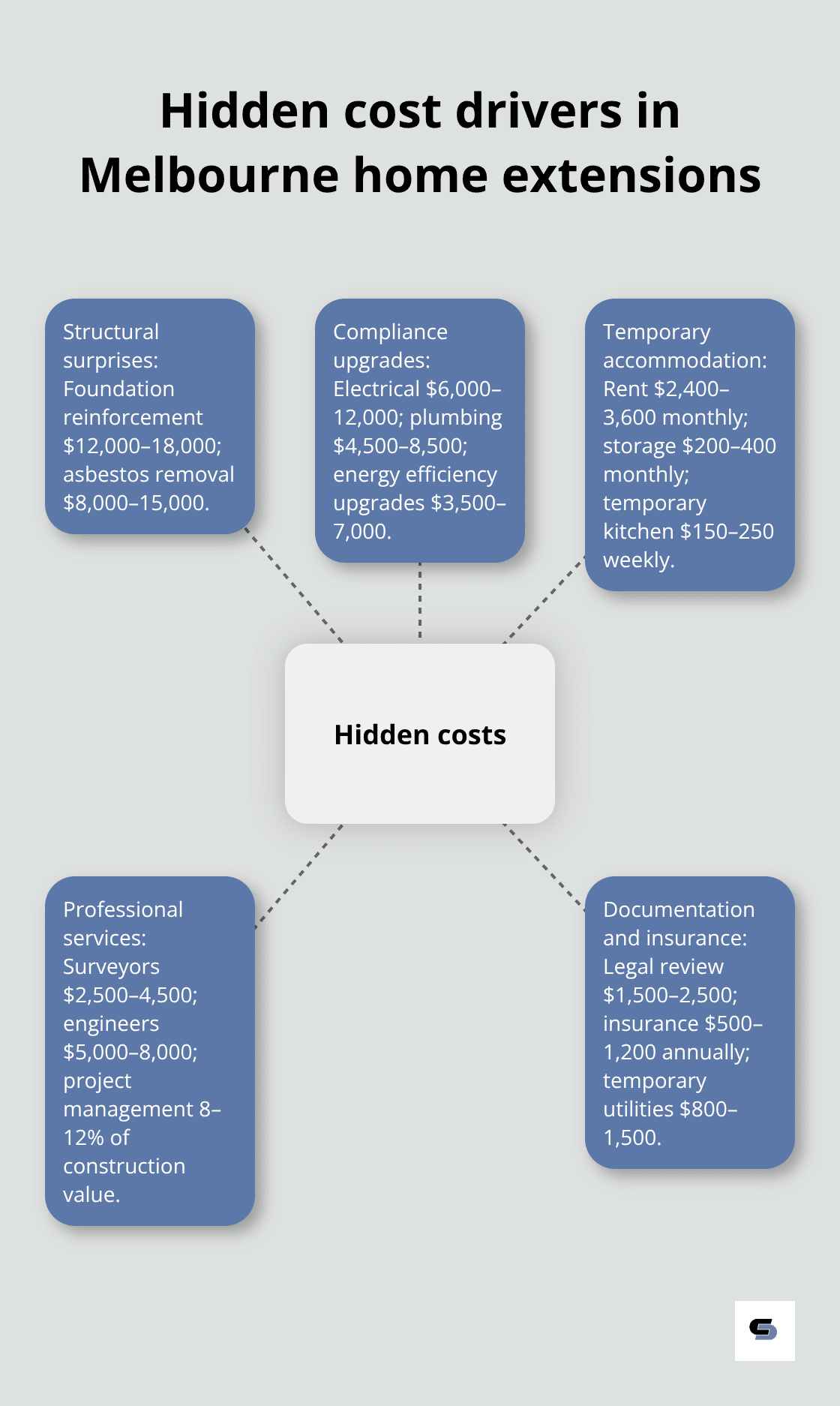
Professional fees accumulate throughout projects, with building surveyors charging $2,500-4,500, engineers adding $5,000-8,000, and project management services costing 8-12% of total construction value. Interior designers charge $150-200 hourly, while landscape architects add $3,000-6,000 for outdoor integration plans.
Documentation and Legal Costs
Documentation and professional services represent 15-20% of total project costs but provide essential protection against delays and compliance issues. Building contracts require legal review costing $1,500-2,500, while contract variations average 10-15% of original contract value (according to Housing Industry Association statistics). Insurance adjustments for construction periods cost $500-1,200 annually, and temporary utility connections add $800-1,500 to budgets. These hidden expenses typically total $25,000-45,000 above quoted construction costs.
Final Thoughts
Melbourne extension costs reflect multiple factors that demand careful financial preparation and professional oversight. Material price increases of 15-20%, labour shortages that push rates above $100 per hour, and complex soil conditions create significant budget variables across all project types. Ground floor extensions start at $3,200 per square metre, while double storey projects reach $6,200 per square metre due to structural complexity and additional requirements.
Hidden costs consistently add $25,000-45,000 to quoted prices through compliance upgrades, temporary accommodation expenses, and professional service fees. The cost of extension Melbourne projects requires thorough soil assessment, accurate permit calculations, and realistic contingency reserves of 15-20% above base estimates (particularly for heritage properties with additional restrictions). Professional quotes from registered builders provide accurate cost breakdowns and protect homeowners against unexpected budget overruns throughout the construction process.
Multiple detailed quotes help identify realistic market rates and potential cost variations before construction commences. We at Cameron Construction provide comprehensive extension services across Melbourne’s council areas with detailed cost estimation and permit management support. Contact our team for professional guidance on your extension project and accurate budget planning tailored to your specific requirements.

